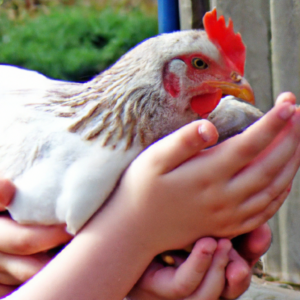
Imagine a peaceful backyard, filled with the cheerful clucks of content chickens and the joyful laughter of children. But how can you make sure that handling these feathered friends becomes a safe and enjoyable experience for both parties involved? This article seeks to answer that very question – providing you with practical tips and invaluable insights on how to acclimate chickens to being handled by children. It’s time to create a harmonious bond between kids and chickens, fostering a love for nature and responsible pet ownership. So, let’s dive into this heartwarming journey of friendship and nurture!

Choosing Kid-Friendly Chicken Breeds
When choosing chicken breeds that are suitable for children, there are a few factors you should consider. First and foremost, you should look for chicken breeds with a friendly and docile temperament. Some breeds have a reputation for being more aggressive or flighty, which may not be ideal for children. It’s also a good idea to look for smaller breeds as they are typically easier for children to handle and interact with. Additionally, it’s important to do thorough research on child-friendly chicken breeds to ensure that you select the right breed for your family.
Providing a Safe Environment
Creating a safe environment for both the chickens and the children is crucial. Building a secure coop is essential to protect your chickens from predators and to provide them with a safe shelter. Make sure the coop is well-constructed and has proper ventilation.
It’s also important to create a child-friendly chicken run where children can safely interact with the chickens. The run should have a sturdy fence to prevent the chickens from escaping and to keep out any potential predators.
Speaking of fencing, it’s important to ensure that your entire chicken area is properly fenced off. This will help prevent predators from entering and keep your chickens from wandering into areas where they may be at risk.
In addition to keeping predators out, it’s essential to maintain cleanliness within the coop and the chicken run. Regularly clean and sanitize the chicken coop to minimize the risk of disease and ensure a healthy environment for your chickens and your children.

Positive Reinforcement Training
Training your chickens to be comfortable around children can make the interaction between them more enjoyable for everyone involved. One way to do this is by familiarizing your chickens with children’s voices. Encourage your children to spend time talking to the chickens and let them get used to the sound of their voices.
Another effective method is offering treats from the children’s hands. This positive reinforcement will help the chickens associate children with something pleasant. Just make sure your children understand the importance of holding the treat still, as chickens may peck if they feel threatened.
Handling chickens gently and calmly is crucial to their comfort and well-being. Teach your children to approach chickens slowly and avoid any sudden movements. Developing a routine for interaction can also help the chickens feel more at ease, as they will come to expect and anticipate the interaction.
Teaching Children Proper Handling Techniques
When interacting with chickens, it’s important that children understand the importance of gentle touch. Explain to them that chickens are delicate creatures and that rough handling can cause them harm or distress. Teach them to stroke the chickens gently and to avoid pulling on feathers or squeezing too tight.
Demonstrating the correct ways to hold chickens is also essential. Show your children how to support the chicken’s body properly, making sure to support both the wings and the legs. This will help the chicken feel secure and reduce the risk of injury.
Supervising and guiding children during interactions with chickens is crucial to ensure both their safety and the welfare of the chickens. Keep a close eye on how the children are handling the chickens, and intervene if necessary to correct any improper handling techniques.

Developing Trust and Bonding
Building a strong bond and trust between chickens and children is a key aspect of creating a positive and enjoyable relationship. Spending dedicated time with chickens and children together can help facilitate this bond. Encourage your children to sit quietly near the chickens, allowing the birds to approach them on their own terms.
Promoting calm and relaxed interactions is important for building trust. Teach your children to speak softly and move slowly around the chickens, minimizing any potential stress or fear.
Allowing chickens to approach children on their own terms helps to establish trust. Chickens, like any living creature, have their own comfort zones and boundaries. Allowing them to approach and interact at their own pace will help build trust and create a positive experience for both chickens and children.
Monitoring Chicken and Child Interactions
When introducing chickens and children, it’s important to supervise their initial interactions closely. Watch for any signs of discomfort or fear from either the chicken or the child. This will allow you to intervene and address any potential issues early on.
Observing the chicken’s body language is a valuable way to assess their comfort level. Signs of stress or fear can include fluffed feathers, crouching, or excessive vocalization. Teach your children to recognize these signs and to adjust their behavior accordingly.
Simultaneously, it is also necessary to educate your children about the signs of stress or fear in chickens. This will help them understand when it’s time to step back and give the chickens some space.
Gradual Exposure to Handling
To ensure that both the chickens and the children feel comfortable during interactions, it’s best to start with short and infrequent handling sessions. This gradual exposure will allow the chickens to acclimate to being handled and also give the children a chance to learn proper handling techniques.
As the chickens become more accustomed to being handled, gradually increase the duration and frequency of these sessions. Pay attention to the chicken’s reactions and body language to gauge their comfort level. If the chickens appear stressed or agitated, it may be a sign that they need more time before progressing to longer or more frequent handling sessions.
Socializing Chickens with Children
Encouraging children to spend time in the chicken’s environment can help socialize the chickens and build a positive relationship. Involving children in chicken care activities such as feeding or collecting eggs allows them to develop a sense of responsibility and ownership.
Promoting positive interactions between chickens and children is crucial for fostering a bond. Encourage your children to speak softly, move gently, and offer treats or favorite foods to the chickens. This positive reinforcement will help strengthen the association between the children and pleasant experiences for the chickens.
Building Confidence through Familiarity
Repetition and consistency in handling routines are essential for both children and chickens. By consistently following proper handling techniques, your children will become more confident and comfortable around the chickens.
Allowing chickens to recognize and approach familiar individuals can also help build trust and confidence. Encourage your children to spend regular and consistent time with the chickens, as this will allow the chickens to become familiar with their presence and develop a sense of trust.
Lastly, be sure to emphasize the importance of calm and gentle behavior from children. This will help maintain a relaxed environment and prevent any potential stress or fear that could negatively impact the chickens.
Addressing Fear or Aggression
In some cases, chickens or children may exhibit fear or aggression during interactions. It’s important to identify the underlying causes and address them appropriately. Fear or aggression can stem from past negative experiences, a lack of socialization, or even medical issues.
Implementing desensitization techniques can be helpful in gradually acclimating chickens or children to the feared or aggressive stimulus. This may involve exposing them to the stimulus in a controlled and positive manner, slowly increasing their exposure over time.
If the fear or aggression persists despite your efforts, it may be necessary to seek professional help. Consulting with an animal behaviorist or chicken expert can provide specialized guidance to address the specific issue at hand and ensure the safety and well-being of both chickens and children.
In conclusion, acclimating chickens to being handled by children requires patience, education, and positive reinforcement. By choosing kid-friendly chicken breeds, creating a safe environment, training both the chickens and the children, and focusing on trust-building and positive interactions, you can create a harmonious relationship between chickens and children. Remember to always prioritize the welfare of the chickens and the safety of the children throughout the entire process.







